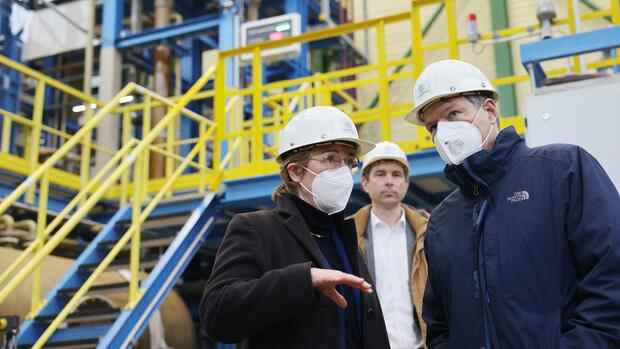The Economics Minister has the Thyssen-Krupp boss show him a hydrogen production plant in Duisburg.
(Photo: dpa)
Duisburg Federal Economics Minister Robert Habeck (Greens) visited Europe’s largest steel site on Tuesday: Thyssen-Krupp in Duisburg. The group needs huge amounts of coal and coke for its production. In the future, Thyssen-Krupp wants to switch to climate-neutral hydrogen in steel production. Habeck wants to support the transformation process of the steel industry.
When Habeck arrives at the hall in which the hydrogen is to be produced, he quickly comes to the question of the possible dimensions. He asked a ThyssenKrupp employee what the largest possible system of this type that the company could build would be.
If Habeck wants to put his plan into action to actually bring the venerable German industry from being a climate sinner to CO2 neutrality, the path will not lead past superlatives. The Minister of Economic Affairs probably didn’t like the answer to his question: “The one we’re building in Saudi Arabia right now,” says the worker, “is 20 megawatts.”
The hydrogen from there will certainly also help German industry in the future. But Habeck’s vision is much more to make the green transformation come true in all steps in Germany. And: The transformation should also aim for independence from foreign energy – a goal whose importance is higher than ever these days.
Top jobs of the day
Find the best jobs now and
be notified by email.
It was Habeck who withdrew the “supply security report” for the Nord Stream 2 gas pipeline on Tuesday morning. An administrative act with explosive power: The completed but not yet operational connection between Russia and Germany is thus on hold. It is the German government’s reaction to Russian President Vladimir Putin’s recognition of the separatist regions in eastern Ukraine and the deployment of troops in the areas.
Steel is to be produced with hydrogen from 2025
While Habeck has to take care of the geopolitical tensions that have not been there for years, he does not want to lose sight of the transformation of the economy. Because the state is needed for this – not only does the Green politician see it that way, but also the economy.
That will not be an easy task for the philosopher and author, whom they listened to closely at Thyssen-Krupp. In his black suit with tie and brogues on his feet, Habeck didn’t really fit into the picture between blast furnaces and mountains of coal. At least not until he put on a blue windbreaker when Thyssen boss Martina Merz showed him the “Walsum construction site” on the Duisburg site.
The blast furnace of the future is to be built here up to a lofty 150 meters and steel will be produced with hydrogen from 2025.
Robert Habeck came in a black suit with a tie and didn’t really fit into the picture between blast furnaces and mountains of coal, at least not until he put on a blue windbreaker.
(Photo: dpa)
“Massive investments” are needed, explained Thyssen-Krupp boss Merz during Habeck’s visit – and the federal government must undoubtedly support that. Most other companies in German heavy industry have now come to terms with the idea of having to change and relying on the state to do so.
But the case of Thyssen-Krupp shows that Habeck not only has to get the economy behind him, but also the political apparatus. The first of several tranches of state support are actually already available for the steel producer.
An unknown sum is to flow for the 1.2 billion euro hydrogen blast furnace on the “Walsum construction site”, that has actually been clear since May 2021. The federal government has agreed to take over 70 percent, 30 percent come from the state of North Rhine-Westphalia.
The Economics Minister wants to support industrial groups like Thyssen-Krupp in converting to climate neutrality.
(Photo: dpa)
But the support would not be possible just like that, it would fail because of European state aid law. Therefore, the money flows through the “Important Project of Common European Interest” (IPCEI). Hydrogen projects can thus be funded more easily – provided that Brussels agrees. And that’s exactly the problem.
The funding decision for Thyssen-Krupp is currently with the EU Commission. But the group has been waiting for a response for more than half a year. “Companies as a whole are standing by their guns and want to invest. It would be good if the EU Commission didn’t let us down there,” explained Habeck, without naming Thyssen-Krupp specifically.
In the transformation of the economy in all areas, companies “that want to get started” and states that want to support this transformation should “not be slowed down”.
More: Habeck wants to extend energy abuse supervision and plans new rights to intervene against US tech companies
